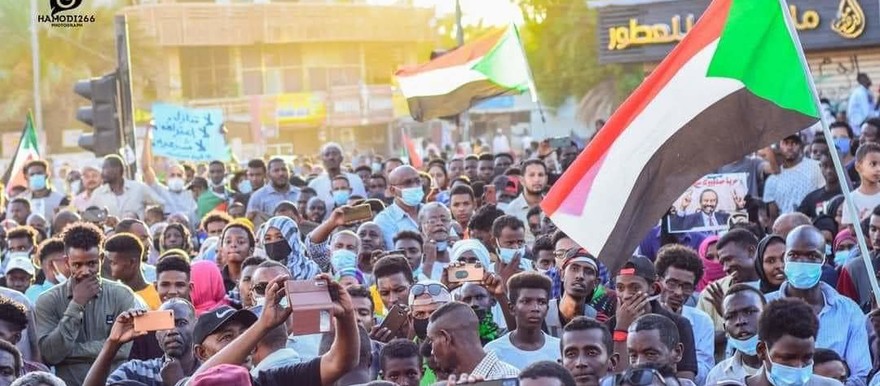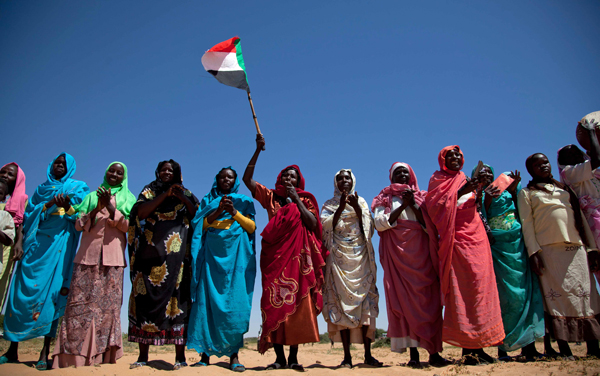Download the letter here.
Dear (Representative (______)/Senator (______),
My name is (____), and I am from (state of ____).
I am extremely concerned by the current situation in Darfur, Sudan. I am writing to you in support of this attached letter from the Darfur Women Action Group co-signed by 41 Sudanese civil society organizations demanding that Darfur be placed under International Trusteeship. I ask you to demand that the US government take swift action to support the implementation of the International Trusteeship. It will save lives, ensure accountability, and provide a path for peace and democratic transformation in Sudan.
As you know, on April 15, 2023 the Sudanese military and the Rapid Support Forces (RSF), led by Generals Abdel Fattah al-Burhan and Mohamed Hamdan Dagalo, formerly allies, went to war with one another launching brutal and indiscriminate attacks inside Khartoum and other areas. The deadly conflict has spread with no regard for civilian safety as both militias utilize heavy machine guns, artillery fire, and military planes.
When the conflict reached Darfur it escalated to an alarming scope. The attacks became systematic, intentionally and precisely directed toward harming and eliminating the indigenous African population. Eyewitness accounts confirm this conclusion. Through slaughter, deprivation of access to food, water, medical assistance and by restricting transportation of those in need of urgent medical attention, the RSF has begun to carry out a genocide in Darfur. This is why I am joining the call of 41 Sudan and Darfuri civil society organizations to place Darfur under International Trusteeship. International action is required to stop the campaign conducted by the Rapid Support Forces (RSF) and allied Arab Militias to uproot the indigenous people from their homeland. Our call is to save lives and stop the mass extermination and mass exodus of the Darfuri indigenous African civilians which is currently underway.
More than 250,000 people have fled Darfur to Chad alone in the past seven weeks. On June 4th, the city of Kutum was attacked by Rapid Support Forces killing over 50 people and wounding others, burning the entire city, the market, and the entirety of the internally displaced Kassab camp, housing over 100,000 displaced genocide victims who were forced to flee Darfur over the past 20 years. The city of El Geneina has suffered attacks more than five times. The death toll reportedly exceeds 5,000, and more than 8,000 are currently wounded and desperately need medical attention, food, water, and other basic needs to survive. But they are prevented from seeking emergency treatment. El Geneina is facing an unprecedented humanitarian crisis as the city has been completely destroyed, along with all government institutions and services, including hospitals and water sources.
In addition to the slaughter, deprivation of access to food, water, medical assistance, the RSF has added new tactics to its genocidal strategy. It has resorted to restricting transportation of those in need of urgent medical attention, blocking access to phone services, Internet, electric and other services. Taken together, the tactics the RSF has used in Darfur to deprive civilians of connection and aid makes survival nearly impossible. The RSF have also forced the remaining population into a massive exodus. Humanitarian aid workers and diplomatic personnel have suffered attacks, as seen in the tragic deaths of World Food Program (WFP) workers in Kabkabiya town. The army has placed civilians at a greater risk of death by cutting power, access to the internet, and phone services in most cities, effectively depriving them of emergency services and other basic needs such as food and shelter. As of now, all communications from West Darfur remain cut off.
These patterns were deliberately used and witnessed in El Geneina, West Darfur’s Kutum City and Tawila City in North Darfur, Kas in South Darfur, Morney City and Wadis Salih area and Manawashy are among cities targeted and isolated from any form of access. Many more cities are expected to see similar violent trends as the RSF forces are moving swiftly through the Darfur region. As they go, they spread recorded video messages announcing their intent to destroy and kill more people.
More than two-thirds of the greater Darfur region is currently in complete anarchy, out of the realm of government involvement. There is no control over its borders. The RSF is rapidly taking control over cities with the stated intent to kill everyone. Today, in a region the size of France, only two cities remain partially controlled by the Sudanese Armed Forces (SAF) while the RSF control the other portion of the cities with attacks and occupation of people’s homes and preventing civilians’ movement within and out of the cities.
We appeal for Trusteeship on the basis that these strategies constitute genocide. They are targeted killings of specific identified groups of people, massive/forced displacement, uprooting the people from their land and source of sustenance, while imposing extremely harsh conditions through intentional starvation, deprivation from medical assistance coupled with harsh, unbearable psychological and physical conditions.
The only state that has not been attacked is El-Daein, stronghold of Rezaigat tribes, mainly groups affiliated with RSF, where the military has now unanimously declared their support of RSF – making Darfur almost fully under RSF.
Over too many years, Darfuri people have continued to suffer destruction and death in slow motion. We believe that a region occupied by two thirds of the Sudanese population cannot be ignored. We, the undersigned, urge the United States, the United Nations Security Council, the European Union, and the African Union to take swift multi or bilateral action to place Darfur under an international trusteeship that can be led by a coalition of willing participants to protect Darfur and the entire region from disintegration. This will allow displaced civilians to be protected, return home, rebuild their lives and work with others to peacefully transform Sudan into a stable society.
We urge you to demand the US and the UNSC take an atrocities prevention approach to the crisis in Sudan which starts with robust civilian protection intervention that enables life-saving humanitarian access, and accountability for those responsible for serious international crimes, then peace and transformation will follow.
The people of Sudan are looking up to you in their time of great need and we believe you will not spare any effort that can help save lives and bring sustainable peace.
Taking the following will be necessary to save lives and bring sustainable solution to Sudan:
- Placing Darfur under international trusteeship to end the genocide attack and uprooting to the indigenous Africans population in Darfur and prevent the disintegration of Sudan.
- Enable unhindered humanitarian access to all in need in Darfur and Sudan at large.
- Impose accountability for perpetrators of serious international crimes.
- Impose targeted sanctions on the two warring generals and their allies to cut the war financing, flow of weapons and destruction in Sudan through verified assets freezing and travel ban.
The people of Darfur and Sudan need your voices and we as your constituencies urge you to be their voice. In the face of genocide our leaders and our countries must not look the others
We appreciate your kind consideration.
Sincerely,
The Undersigned:
- Darfur Women Action Group
- Darfur Relief and Documentation Center, Geneva, Switzerland
- Darfur Diaspora Association, Toronto, Canada
- Darfur Association of Canada
- Darfuri Women Voice, Greater Darfur, Sudan
- Women for Peace and Security Forum, Sudan
- South Darfur Women Forum, South Darfur, Sudan
- Massalite Community in the United States of America, Dayton, Ohio
- Darfur Association of North America, Baton Rouge, Louisiana
- Darfur People’s Association, NY, NY
- Darfur Association AZ Inc, Phoenix Arizona, USA
- Darfur Community Organization, Omaha, Nebraska
- Darfur Union, The Netherlands, The Hague Netherlands
- Darfur Bar Association, Khartoum, Sudan
- Darfur Association of Sweden
- Fur Solidarity USA, USA
- Darfur Association of Florida
- Sudanese’s Community, Jacksonville Florida
- Darfur Association of Italy, Rome, Italy
- Darfur union UK, London, UK
- Darfur Association of Wales, UK
- Moisiron for Integrated Support Organization, Khartoum, Sudan
- Women Peace and Development Organization, South Darfur, Sudan
- Greater Darfur Women Forum, Greater Darfur
- Women Of Change Organization, El Geneina, West Darfur Fur Association of UK and Ireland
- Darfur Union, USA
- Women Organization for Peace and Development, Sudan
- East Darfur Women Forum, East Darfur State, Sudan
- Darfur Civil Society Forum
- United Women Movement, South Darfur, Sudan
- Women and Child Development Society, North Darfur, Sudan
- Stichting Wadi, the Hague, The Netherlands
- The Massalite Association in South Sudan, Juba S Sudan
- Bargo People Association of South Sudan, Juba S. Sudan
- Darfur Network for Human Rights, Kampala, Uganda
- Darfur Association of France, Paris, France
- Muzna Charitable Organization, Sudan
- Rural Extension Education and Development Organization, Sudan
- Tollan for Peace and Development, Sudan
- Omdorien Women Association for Development and Child Care
- Sudanese women development organization
I appreciate the United States’ condemnation of both the recent fighting and the 2021 coup plus the call for the end of this conflict. Additionally, I appreciate the US Treasury imposing sanctions on four designated companies that were contributing to the conflict in Sudan. While these sanctions are an essential first step to ending the conflict, as the sanctions cut off key financial flows to both the Rapid Support Forces and the Sudanese Armed Forces, the U.S. needs to take more action. To end this war, restore a civilian-led government, and promote peace and stability, I urge you in your roles to demand that the US lead and encourage the UNSC to place Darfur under international trusteeship immediately as the only effective tool now available to save countless lives.
As a member of your constituency, I implore you to be our voice and a voice for the people of Sudan in their time of critical need by urging the US government to take the following measures:
- Urge the UNSC to place Darfur under International Trusteeship.
- Pressurize Sudan to immediately stop the fighting and open unimpeded nationwide access to humanitarian agencies so they can deliver life-saving assistance.
- Press the Sudanese government to restore power, water, internet, and phone access without further delay to preserve lives.
- Urge the US government to impose targeted sanctions, asset freezing, and travel bans on individuals responsible for the current crisis, the coup, and for ordering excessive force against civilians to ensure they face accountability for their actions.
- Call on the US government to prioritize accountability, the protection of human rights, and life with dignity for the people of Sudan as the main pillars of the US policy.
The above steps are necessary and prerequisite to create an enabling environment for a just peace and democratic transformation of Sudan.
For the solution to be effective, US government and other stakeholders working on resolving the crises in Sudan must take an atrocities prevention approach that starts with civilians’ protection, accountability for genocide and other serious crimes, then peace negotiation and finally democratic transformation will follow.
It is imperative that the US stand with the people of Darfur and Sudan in this difficult time and work with allies to bring protection, accountability to be followed by peace and a civilian-led government. This is the only way to prevent genocide and bring about democracy and sustainable peace. As members of your constituency, we look up to you and kindly urge you to be our voice and the voice for those voiceless in Darfur by supporting our call for trusteeship.
Thank you for your serious consideration of this urgent request.
Sincerely,
(Name)



